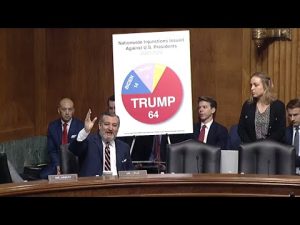
In the bustling city of Washington, D.C., where monuments stand tall and history speaks from every corner, there once was a site known as BLM Plaza. People gathered there for reasons as complex as the city itself — a nation conflicted over justice, race, and the rules that bind society. Yet, as the echoes of past protests fade, a quiet tragedy unfolds that ought to capture the same level of heartbeat. Austin Metcalf, a promising 17-year-old student, met his untimely end at a Texas track meet, and this tale speaks volumes about the nation’s soul.
Austin was not just another face in the crowd. He was an extraordinary student, a cherished brother, and a rising star both academically and athletically. Profoundly committed to his faith and family, Austin had dreams as bright as the Texan sky. Tragically, these aspirations were cut short in a senseless act of violence, leaving his family and community reeling with shock and grief. While the scene wasn’t as grand as a national protest, for those who knew him, their world has been forever altered.
The incident unfolded when Austin politely asked a fellow student, Karmelo Anthony, to move from his seat. Instead of a simple resolution, the response was as violent as it was unexpected. Karmelo, with a heart as cold as the steel he wielded, attacked Austin, leaving him fatally wounded. His twin brother held him close, cradling life’s fragility in his arms, trying desperately to stem the tide of tragedy. Despite heroic efforts, Austin succumbed to his wounds, leaving behind not just memories, but a haunting question — why?
People are quick to rally around certain cases, but where is the outrage for Austin? This young man’s story seems lost amidst a sea of selective activism. If situations were reversed, cries of injustice might echo louder across the media landscape. Yet here, in Austin’s heartbreaking reality, the nation seems alarmingly quiet. Those who champion equality and justice appear oblivious, and the press barely whispers his name. It’s a daunting reminder of how society picks its narratives, often ignoring stories that don’t fit neatly into preconceived boxes.
Austin’s legacy points to a deeper truth about the values we hold dear. His father expressed an almost unfathomable grace, finding solace in faith amidst the void left by his son’s absence. As the family searches for answers within a nightmare, they emphasize love, forgiveness, and hope for change. While Austin’s flight may have been grounded, his impact soars through those left behind. It’s a call for communities everywhere to stand up, to demand justice that isn’t conditional on media interest or public spectacle.
In Austin’s memory, we face a pivotal choice — to stand quietly on the sidelines or to elevate stories that challenge us all to strive for a better world. From the tragedy in Texas to the towering monuments in D.C., let this heartbreaking tale ignite a movement where every life dedicated to goodness and greatness is honored and remembered, no matter the odds. It’s a reminder that justice, regardless of who wields it, ought to be impartial and unfailing, for the measure of a nation lies in how it treats its finest hearts.







